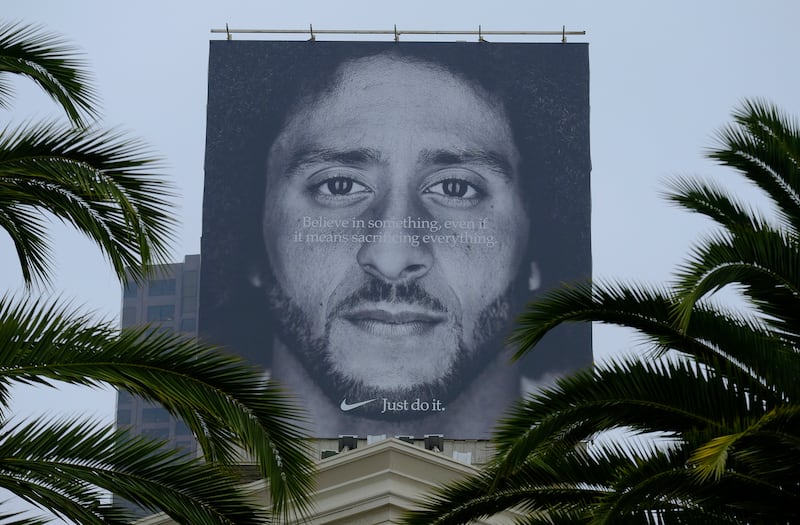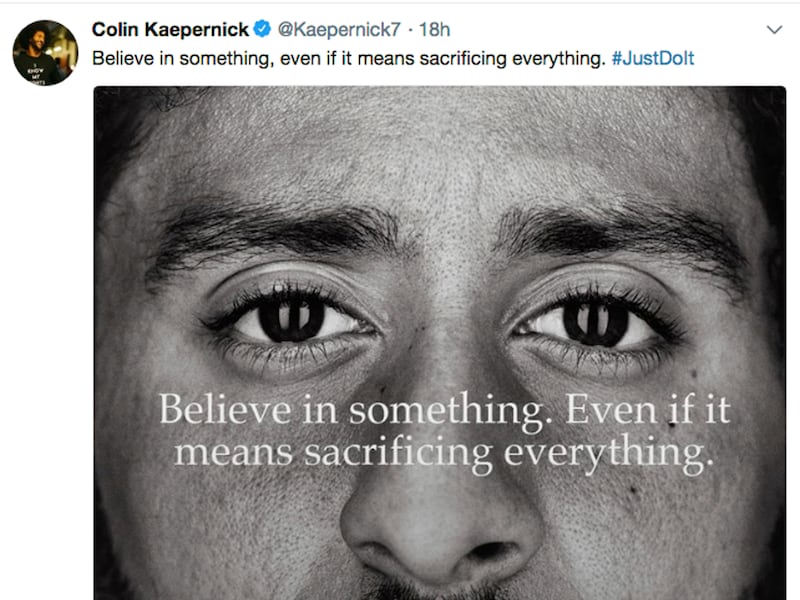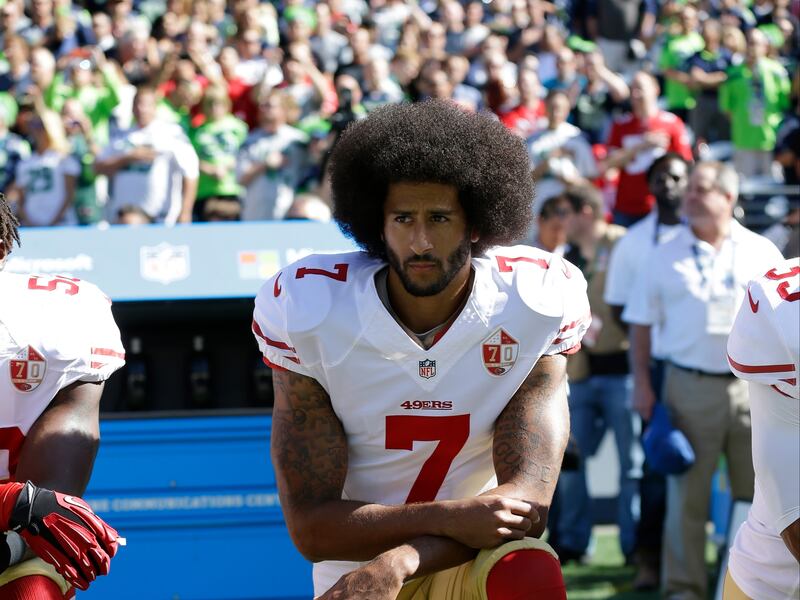SALT LAKE CITY — In 2010, after Tiger Woods was unveiled as an adulterer, Nike stuck by him, featuring the world's most famous golfer in an ad overlaid with the voice of Woods' father saying, "I want to find out what your feelings are. And did you learn anything?"
Nike learned something from that campaign: that outrage subsides and the American public has an enormous capacity for forgiveness. Woods is back on the PGA Tour, his lucrative relationship with Nike untouched.
But the company's latest controversial ad — one featuring former NFL quarterback Colin Kaepernick and the words "Believe in something. Even if it means sacrificing everything" — raises issues more important than temporary fluctuations in the price of Nike stock, and is starkly different from Nike's previous ads in that it takes a political stance.
“For a company to venture into the world of politics is really unusual,” said William M. O’Barr, a professor of cultural anthropology at Duke University in Durham, North Carolina, who has written extensively on advertising and ethics.
The ad has stirred the simmering cauldron of antipathy toward Kaepernick, whose decision to protest racism by kneeling during the national anthem in 2016 started a national movement and a corresponding backlash against it. And the campaign could further inflame the polarization of America, said Abe Bakhsheshy, professor of ethics and organizational behavior at the David Eccles School of Business at the University of Utah.
Unveiled on Labor Day as part of a campaign celebrating the 30-year anniversary of its iconic "Just Do It" slogan, the Kaepernick ad prompted a #boycottNike hashtag on Twitter and some people have destroyed their Nike merchandise in videos on social media.
Nike, however, seems undaunted by the outcry, and said it would air the ad during the televised NFL season opener Thursday. And the company has already reaped about $43 million worth of media exposure, analysts say.
Advertising and marketing experts say the brand is universally beloved and unlikely to suffer lasting financial consequences from the decision. But community standards matter in advertising, which makes the Kaepernick ad and others like it risky in a community comprised of 328 million people with disparate tastes.
Attitude, not product
O’Barr, founder of the scholarly website Adtext.org, is watching the campaign with interest because Nike has so profoundly departed from traditional mores in advertising. “The main thing that’s happening is they are challenging the political structure of America. The president has clearly spoken on this issue (kneeling during the anthem) and doesn’t like it. Nike goes the other way,” O’Barr said.
He said it’s possible the company has done market research and is deliberately reaching out to people who are likely to side with Kaepernick and embrace his stance against police brutality and discrimination against African-Americans.
In fact, YouGov, a marketing and research firm, said Wednesday that recent buyers of Nike merchandise are more likely to have a favorable view of Kaepernick. Overall, YouGov found that 34 percent of American adults view Kaepernick favorably while 31 percent view him negatively. But among people who have bought Nike products in the past three months, 43 percent have a favorable view of Kaepernick and 23 percent do not.
Bakhsheshy, at the University of Utah, noted that Nike’s core customer base includes millennials and African-Americans who are more likely to be sympathetic with Kaepernick or ambivalent about the controversy, and more likely to applaud a stance that promotes diversity and freedom of speech.
The company is also embroiled in an internal controversy, having been accused of gender discrimination in a lawsuit filed last month, and Bakhsheshy said the campaign could be seen as an effort to create a different image, one in which it embraces diversity of thought.
“On the other hand, there would be individuals who are going to say it is wrong to use a national controversy to create more divisiveness among the people of this country,” he said.
Nike did not respond to a request for an interview, but the company's website says its mission is “to bring inspiration and innovation to every athlete in the world.”

For precedence, O’Barr recalled a series of controversial ads by the clothing manufacturer United Colors of Benetton. “Benetton ads never talked about clothing, but always had pictures of newsworthy events. They never showed their product, but they would have things like boats of refugees and a guy dying from AIDS and black people and white people kissing each other. Their argument was they wanted people to discuss issues that were important.”
Such ads market more than a product, but a feeling and attitude, and the companies hope consumers attach those feelings and attitudes to a brand, he said. And part of what athletes do is challenge things. “They’re not like everyone else. There’s an attitude here. Maybe that’s what they’re tapping into,” he said.
The advertising agency that developed the campaign, Wieden+Kennedy, says it builds "strong and provocative relationships between good companies and their customers."
But some Americans who believe that kneeling during the anthem is disrespectful see Nike as deliberately divisive and not good. They've set shoes on fire and cut Nike's famous swoosh out of socks (causing some Twitter users to plead that people donate their Nike goods to the poor, instead of destroying them).
https://twitter.com/RuBhikha/status/1037216977440452609
Nike’s stock fell 3 percent, a total of about $3.75 billion in value, the day after the announcement, no small loss for the company, said David Campbell, president and chief operating officer of Chernoff Newman, an advertising agency based in Columbia, South Carolina.
While some companies can get away with pushing boundaries, there are limits, and companies that purchase ads, and the companies that produce them, have a responsibility to be mindful of the overall effect of their campaigns, Campbell said. “I don’t think it’s right to polarize (people) for short-term sales,” he said. As an example, he said it would be seen as irresponsible if a gun manufacturer decided to push a sale on AR-15 rifles to push an agenda. “Is that good for the world?” he said.
Campbell also said it’s unlikely the ad will change anyone’s opinion. “To some people, Kaepernick was doing the right thing and being brave; to others, he was disrespectful. I don’t know that this will change their minds one way or the other. It’s just going to reinforce whatever they were thinking.”
'Believe in something'
On billboards and on Kaepernick's Twitter post, a tight closeup of the athlete's face is shown with the words "Believe in something. Even if it means sacrificing everything." He makes that same statement narrating the video ad.
If the past is indicative of the future, however, Nike's sacrifice will be minimal for its foray into politics.
After Woods' infidelities were revealed after crashing his car in 2009, shareholders of his most prominent sponsors collectively lost nearly $12 billion in the immediate aftermath of the scandal, according to researchers at the University of California, Davis.
Most of Woods' corporate sponsors dropped him. Nike didn't. It was a decision that proved to be the correct one, at least from a business standpoint, according to Tim Derdenger, an associate professor of marketing and strategy at Carnegie Mellon University's Tepper School of Business in Pittsburgh.

Derdenger and two colleagues analyzed Nike's golf ball sales during the six months after the scandal broke and concluded that the company had lost business but not as much as they would have if they dropped him.
The decision, not only to stick with Woods but also to develop an ad that referenced the scandal, may have seemed risky to some, but Woods was the No. 1 golfer in the world at the time, and his infidelity didn’t change that, Derdenger said. The “halo effect,” or prestige of a brand being associated with a celebrity declined, but not enough to obliterate the fact that the No. 1 golfer in the world was playing golf with Nike balls, he said.
Conversely, Kaepernick is no longer playing in the NFL and entered the national spotlight not for his athletic achievements, but through controversy.
Nike doesn't embrace controversy for controversy's sake; the company dropped cyclist Lance Armstrong in 2012 after his drug-doping scandal. Although an article in Ad Age magazine characterized the Kaepernick ad as the company "leaning into" the anthem debate, Derdenger sees a calculated financial decision.
“There might be a dip right after this, but if it drives more sales from the customer base they’re targeting, this is going to be a profitable decision for them,” he said, adding, “Can this country be made even more polarized? I don’t think so.”




